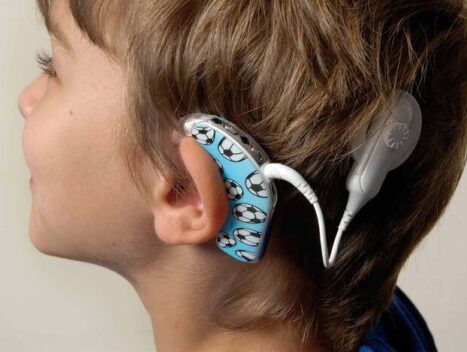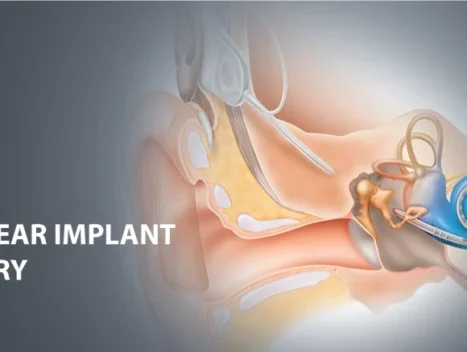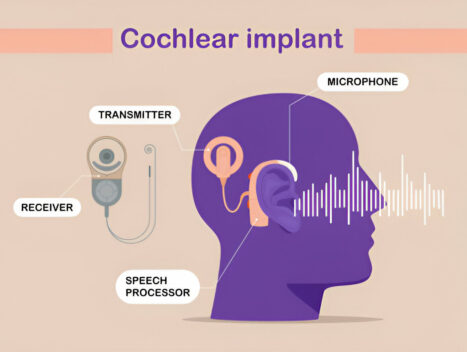
Asked Questions
What is a cochlear implant, and how does it work?
A cochlear implant is a medical device designed to help individuals with severe to profound hearing loss who do not benefit adequately from hearing aids. Unlike hearing aids, which amplify sounds, cochlear implants bypass damaged parts of the inner ear and directly stimulate the auditory nerve. The device has two main components: an external part that sits behind the ear and an internal part that is surgically implanted under the skin. The external component includes a microphone, processor, and transmitter, which capture sound and convert it into digital signals. These signals are then sent to the internal receiver, which sends electrical impulses through electrodes placed in the cochlea (inner ear). The auditory nerve receives these impulses and sends them to the brain, where they are interpreted as sound. While cochlear implants do not restore normal hearing, they allow many individuals to understand speech and environmental sounds better. The results vary depending on factors such as age at implantation, duration of deafness, and the patient’s overall health, but with proper rehabilitation and follow-up, many recipients experience significant improvement in communication and quality of life.
Am I a good candidate for a cochlear implant?
Candidacy for a cochlear implant depends on several medical, audiological, and personal factors. Generally, adults and children with severe to profound sensorineural hearing loss in both ears who receive little or no benefit from conventional hearing aids are considered potential candidates. For adults, candidacy is typically determined through hearing tests, speech recognition assessments, and medical evaluations to ensure there are no contraindications, such as cochlear malformations or auditory nerve damage. For children, especially those under 12 months, the evaluation also includes developmental assessments and consideration of family support. It’s also essential to evaluate the patient’s motivation and expectations—cochlear implants require commitment to auditory training and follow-up. Age is not a strict limitation; older adults can be good candidates if they are in good health and motivated. However, outcomes can vary significantly, especially in individuals who have been deaf for a long time. A multidisciplinary team including an ENT specialist, audiologist, and speech therapist will work together to determine eligibility and guide the patient through the process. For those not currently eligible, evolving technologies may offer future options.
What does the surgery involve, and is it safe?
Cochlear implant surgery is generally a safe and routine procedure, typically lasting 1.5 to 3 hours and performed under general anesthesia. It involves placing the internal receiver-stimulator behind the ear and inserting the electrode array into the cochlea. The surgeon makes a small incision behind the ear and creates a pocket in the bone to house the device. Modern surgical techniques aim to be minimally invasive and preserve any residual hearing where possible. The patient may go home the same day or stay overnight for observation. Recovery is usually quick, with mild discomfort, swelling, or dizziness for a few days. Complications are rare but can include infection, facial nerve injury, device failure, or dizziness. The benefits generally outweigh the risks, especially when surgery is performed at experienced centers. About 1-2 weeks after surgery, the implant is activated, and the external device is fitted. This is followed by regular mapping sessions and auditory therapy. Long-term, most patients adapt well to the device, especially with consistent use and support. It’s important to discuss your individual risks and concerns with the surgeon, as each patient’s health profile is different.
What kind of results can I expect after a cochlear implant?
Outcomes after receiving a cochlear implant vary from person to person, but many patients experience significant improvements in hearing and speech comprehension. For adults who once had normal hearing and later lost it, cochlear implants often restore the ability to understand speech, even without lip-reading. Those born with profound hearing loss may take longer to develop listening and language skills, especially if the implant is delayed. Children implanted early—preferably before age 2—tend to show the most dramatic gains, often acquiring near-normal speech and language with proper therapy. It’s important to note that a cochlear implant does not provide “normal” hearing but rather a different auditory experience that the brain must learn to interpret. This requires time, consistent use, and often months of auditory training. Environmental awareness, understanding conversations in quiet settings, and using the telephone are common milestones. However, understanding speech in noisy environments may still be challenging. Some patients also enjoy music and recognize familiar voices over time. The success of a cochlear implant depends heavily on factors such as duration of deafness, age at implantation, cognitive ability, and engagement in post-operative rehabilitation. With patience and support, many recipients find cochlear implants life-changing.
See Our Latest Blog
- admin
- 0 Comments
Advanced Treatment for Hearing Loss with Cochlear Implant
Understanding Hearing Loss and Its Challenges Hearing loss affects millions of people worldwide and can significantly impact communication, education, employment, and quality of life. While mild to moderate hearing loss can often be managed with hearing aids, individuals with severe to profound hearing loss may not benefit adequately from amplification alone. For such patients, advanced […]
- admin
- 0 Comments
Cochlear Implant Surgery: Types, Benefits, and Procedure
Understanding Cochlear Implant Surgery and Its Importance Cochlear implant surgery has emerged as one of the most advanced medical solutions for individuals with severe to profound sensorineural hearing loss who do not benefit from traditional hearing aids. Unlike conventional hearing aids that merely amplify sound, cochlear implants bypass damaged portions of the ear and directly […]
- admin
- 0 Comments
What are the Benefits of Cochlear Implants
Introduction to Cochlear Implants and Their Significance Hearing is one of the most vital senses that enables human beings to communicate, connect, and interact with the world. When hearing loss occurs—whether due to genetics, aging, injury, illness, or environmental exposure—it can significantly disrupt a person’s quality of life. For individuals with profound or severe sensorineural […]


